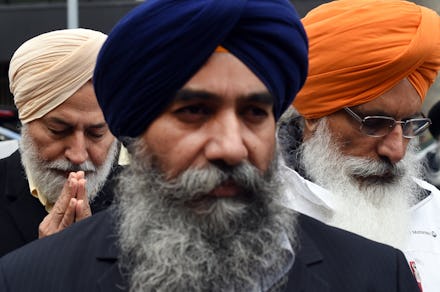Muslims, Sikhs and More Talk Safety Since FBI Started Tracking Hate Crimes Against Them

In March 2015, the FBI started tracking hate crimes against Sikh, Hindu and Arab Americans for the first time in U.S. history. One year later, Colorlines has produced a video asking prominent Sikh, South Asian and Muslim American advocates whether they feel safer today.
The result is almost a foregone conclusion: Since Donald Trump's advance to the front of the Republican presidential race, a rise in Islamophobia rhetoric among candidates has paired with a spike in violence against Muslims and people mistaken for Muslims, creating arguably the most hostile environment these groups have faced since the years following 9/11.
Add that to America's already troubled pattern of discrimination and racial profiling by law enforcement and the TSA, and you have a space where the security of Muslim, Sikh, Arab and South Asian peoples feels as tenuous as ever — even as the government makes strides in calculating the scope of violence against them.
Here are some of the responses given by Suman Raghunathan of South Asian Americans Leading Together, Sahar Alsahlani of the Council on American Islamic Relations-New York and Simran Jeet Singh, a senior religion fellow with the Sikh Coalition in New York City, via Colorlines:
"Many in our communities have not forgotten about the unfortunate and tragic legacy since the events of September 11 around special registration, around the Counter Violent Extremism program and around national programs such as NSEERS," said Raghunathan, after acknowledging the FBI's decision to track hate crimes was a welcome stope. "[These] have not only continued to map and surveil our communities, but to really portray many in our communities as un-American and under suspicion."
Alsahlani reflected on her recent trip to Ferguson, Missouri, saying the multi-faith coalitions that had gathered there to protest showed her that a broad cross-section of struggles in America are more closely aligned than many think. "It really, really reminded me of — I think what I learned when I go to the church is — a 'heaven on Earth,' and really what it is to stand up to an oppressor, and how our struggles really ... are intertwined," she said.
Singh added, "We can easily, as Sikhs, I could easily say, 'Hey, don't attack me, attack that guy, he's the Muslim, that's who you really want.' But you know, my feeling is, A. that's not right, and B. it's not effective, because essentially what I'm doing is deflecting bigotry as opposed to addressing and resolving bigotry. And that's not going to get us anywhere."
The common thread seems to be that tracking data is an important step, but certainly does not solve the problem. Complete figures for the bias incidents that fit these new categories will not be available until later this year, but after the backlash to terrorist attacks in Paris and San Bernardino, California, in 2015, it's clear that deep-seated xenophobic impulses are rising to the surface in serious and troubling ways.
The Huffington Post has calculated 68 Islamophobic incidents — including physical violence, acts of vandalism and intimidation and the implementation of anti-Muslim policies on the local and national level — in 2016 alone. Considering that, it may be some time before Arab, Sikh, Hindu, Muslim and other South Asian and Middles Eastern Americans are permitted to feel safe in their own country.
Watch the entire Colorlines video here:
h/t Colorlines